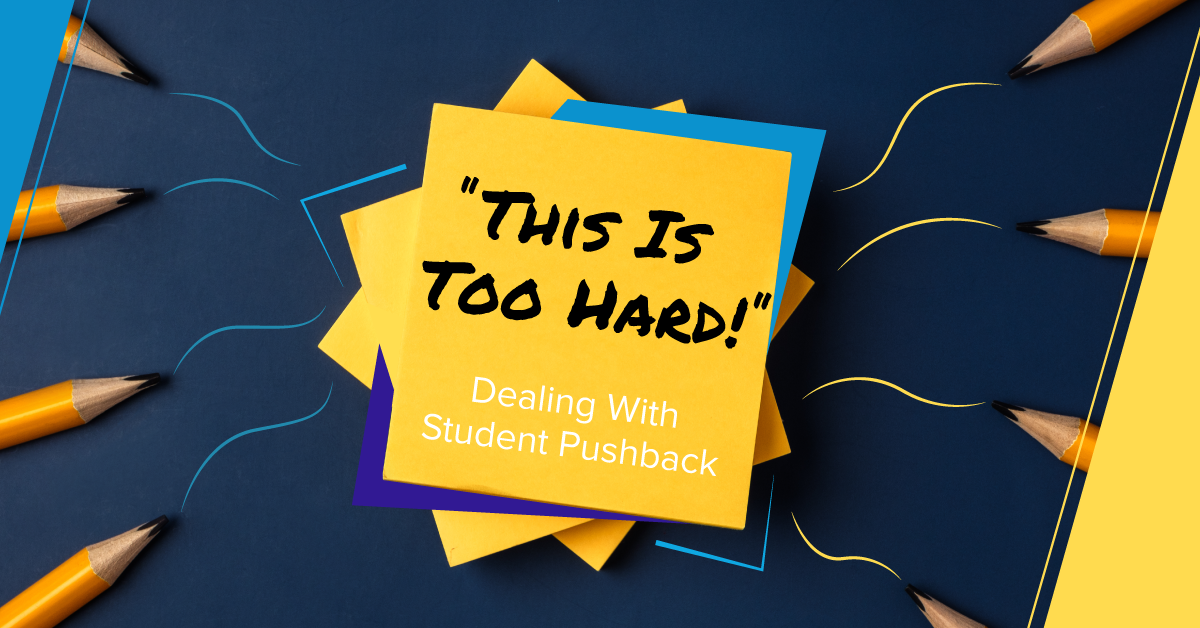“This Is Too Hard!” Dealing With Student Pushback
Have you ever had a student come up to you after drama class or rehearsal and say, “I can’t do (xyz) that we’ve been working on. It’s too hard!” That can be difficult to hear, especially if you’ve been working on that topic or task for some time and this is the first you’re hearing about it. Is your student genuinely struggling and looking for help? Do they want you to make it easier for them? Or are they trying to give up?
Here are 10 tips that can help you deal with student pushback if (or when) it arises:
1. Thank them for speaking up. It can be challenging for students to advocate for themselves. Let them know you’re glad they came to you with their concerns.
2. Have them explain the situation. Can they articulate specifically what they’re having difficulty with? Or is it a general feeling of defeat? Is this an individual problem, or does it affect other students as well? The more details the student can give you, the clearer the situation will be.
3. Ask them for potential solutions. What would they do in your situation? Can they suggest some options, or are they hoping you’ll just fix it for them? This gives you an idea of whether they want help or they just want to complain. As well, it may help you gauge how much effort they’re willing to put in to solve the issue. Are the possible solutions realistic? Are they timely? Do they affect others in any way?
4. Point out resources available to them. Do you have rehearsal videos available? Did the student ask for help from you or a classmate prior to this? Have they been practicing outside of class? Have they done the homework? In short, have they put in the work?
5. Meet them where they’re at. Can something be adjusted or simplified? For example, if they’re struggling with a piece of choreography in a dance number, can the movements be altered? (There may or may not be enough time to do so. How would it affect the other students?) Do they need a different way to look at it? Can you show them a video or article that would help them?
6. Consider the source. Is the work truly too hard or are they just complaining? What else is going on in their lives? Have any other teachers noticed similar things occurring in their classes?
7. Give them encouragement. Remind them that they can do hard things. Give specific examples if you have them. Here are 20 ways to praise your students.
8. At the same time, be honest. It’s good to pump them up but also let them know if, for example, you’ve noticed that they haven’t been using their class time effectively lately or they’ve waited until it’s too close to a deadline or show time to change something. Let them know how a change may affect the rest of the group, if it’s a group project.
9. Come up with a solution. Ultimately, you’ll both need to figure out what to do. You may be able to offer a compromise or give extra help or a new explanation, or there may not be anything you can do at that moment. The student is allowed to feel how they feel about the decision — it’s then up to them to decide how they’ll proceed. It can be a difficult pill for your student to swallow if they’re unhappy with the solution, but hopefully they can learn from the experience.
10.Don’t take it personally. You may feel frustrated or defensive if a student claims that what you’re doing is too hard, but drama class is meant to challenge students. Back up your work and take pride in what you’re teaching. Remember, you are an awesome educator!



